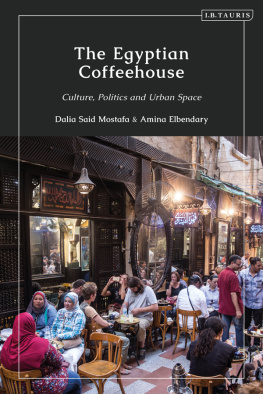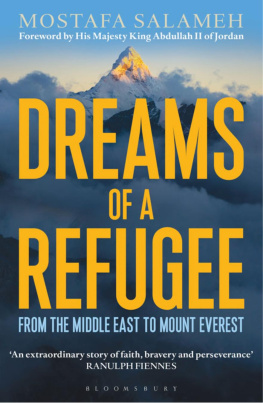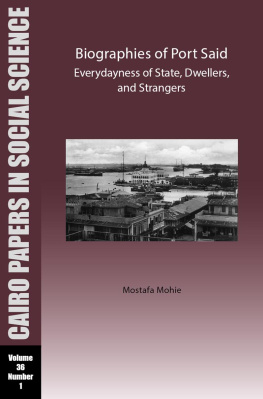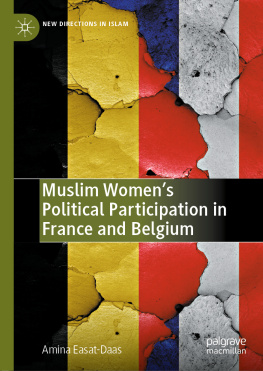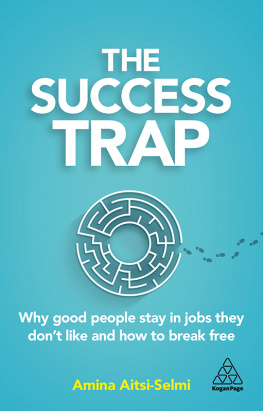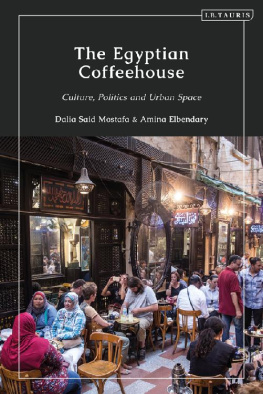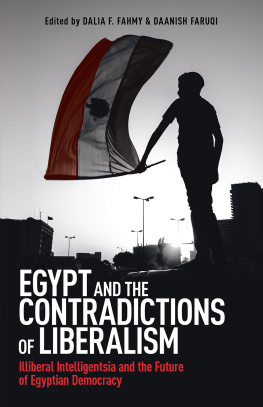
The Egyptian Coffeehouse
The Egyptian Coffeehouse
Culture, Politics and Urban Space
Dalia Said Mostafa and Amina Elbendary

I.B. TAURIS
Bloomsbury Publishing Plc
50 Bedford Square, London, WC1B 3DP, UK
1385 Broadway, New York, NY 10018, USA
BLOOMSBURY, I.B. TAURIS and the I.B. Tauris logo are trademarks of Bloomsbury Publishing Plc
First published in Great Britain 2021
Copyright Dalia Said Mostafa and Amina Elbendary, 2021
Dalia Said Mostafa and Amina Elbendary have asserted their right under the Copyright, Designs and Patents Act, 1988, to be identified as Authors of this work.
For legal purposes the constitute an extension of this copyright page.
Cover design: Adriana Brioso
Cover image Photographer Adel Wassily
All rights reserved. No part of this publication may be reproduced or transmitted in any form or by any means, electronic or mechanical, including photocopying, recording, or any information storage or retrieval system, without prior permission in writing from the publishers.
Bloomsbury Publishing Plc does not have any control over, or responsibility for, any third-party websites referred to or in this book. All internet addresses given in this book were correct at the time of going to press. The author and publisher regret any inconvenience caused if addresses have changed or sites have ceased to exist, but can accept no responsibility for any such changes.
A catalogue record for this book is available from the British Library.
A catalog record for this book is available from the Library of Congress.
ISBN: HB: 978-0-7556-3524-5
ePDF: 978-0-7556-3529-0
eBook: 978-0-7556-3528-3
To find out more about our authors and books visit www.bloomsbury.com and sign up for our newsletters.
Contents
Figures
Plates
Our heartfelt thanks and gratitude go to our friend and colleague Dr Solava Ibrahim (Anglia Ruskin University) who embarked with us from the start on this book project and contributed to the structure and key ideas which have been developed in the book. Solava could not continue this journey with us to the end because she went on maternity leave.
Special and sincere thanks also go to our friend and colleague Dr Michelle Obeid (University of Manchester) who was the first to advise us on including a photo-story and contributed some extremely useful ideas on the structure of .
The support, appreciation and love of our families and friends over the past few years while working on the book made our writing journey enjoyable and pleasant: A big Thank You for the insurmountable love and care you have given us.
Special thanks are also due to photographer Adel Wassily whose pictures, specifically compiled for this book, have added an extra layer of value to the narrative.
Lastly, we are sincerely grateful to our interviewees in Cairo who agreed to contribute their time and wonderful stories about their favourite coffeehouses. Your passion for the Egyptian coffeehouses has been a true inspiration for us.
Introduction
A place for socialization and entertainment, the coffeehouse has long been associated with popular communal gatherings in both urban and rural Egypt. The coffeehouse is a social space which was created and shaped over the decades by the people themselves in their neighbourhoods, and on the cities squares and streets. It is a microcosm of the larger Egyptian society with its history of multiculturalism and great diversity. In a sense, the Egyptian coffeehouse subverts archaic forms of institutionalization and social exclusion. Hence, it has occupied in the popular imagination a sphere that is replete with new ideas, stories, memories and social networks. It is no surprise then that representations of the coffeehouse have taken countless forms in Egyptian literary works, films, songs, photographs, radio and television programmes and drama shows. Historically, the coffeehouse has also played a key role in political mobilization, as well as being a place where the unemployed could access job opportunities through meeting potential employers. Despite the coffeehouses cultural centrality and sociopolitical importance in Egypt, academic research and publications on its significance remain sparse.
This volume aims to fill this academic gap through analysing, for the first time in a full study in English, the importance of the coffeehouse as an urban phenomenon which has cultural, historical, economic and political implications in the contemporary Egyptian society especially in the aftermath of the 25 January 2011 revolution. The main objectives of the volume can be summarized as follows: to theorize and unpack the role and influence of the coffeehouse as a significant feature of contemporary Egyptian life and social relationships; to illustrate the ways in which the coffeehouse has been
Next page
